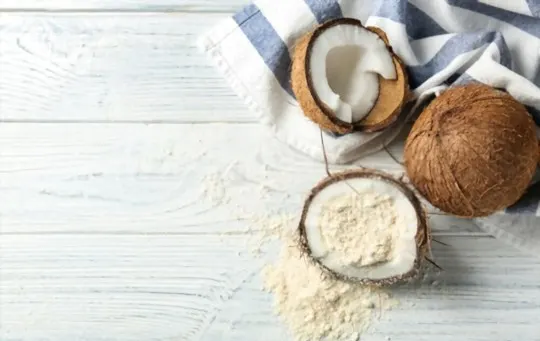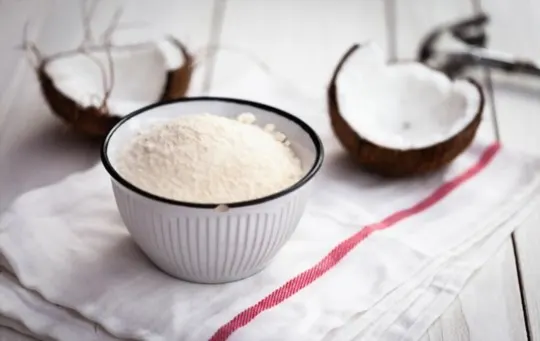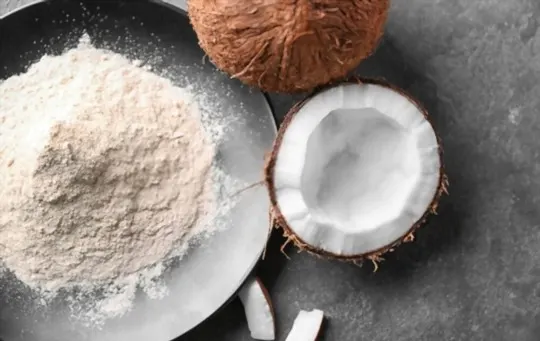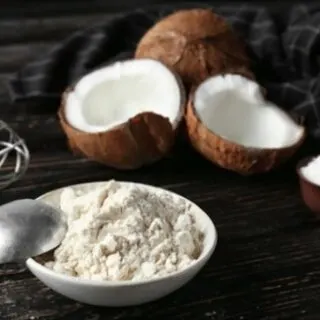Do you ever find yourself staring at a bag of coconut flour, wondering if it will still be edible by the date on the package?
Maybe you’ve had some stored away in your pantry for an extended period of time and you’re not sure whether to toss out what’s been sitting there too long.
Uncertainty can be understandable when it comes to seemingly expiration-less ingredients like coconut flour – after all, who hasn’t questioned how often an unrefrigerated food actually expires?
Fortunately, we have the answers: this blog post covers everything you need to know about how long does coconut flour last?
Does it go bad or spoil? Does it freeze well?
These questions (and more) are all answered below so that you can approach baking with your divine ingredient confidently!
What is Coconut Flour?

Coconut flour is a type of flour made from coconut pulp.
It is a gluten-free and protein-rich alternative to wheat flour.
Coconut flour can be used to make a variety of baked goods, such as breads, cakes, muffins, and pancakes.
It can also be used as a coating for chicken or fish.
Coconut flour is made by grinding up the dried pulp of a coconut.
The pulp is the white fleshy part of the coconut that is left over after the water and milk have been extracted.
The pulp is then dried and ground into a fine powder.
The flour is a good source of fiber and protein.
It is also low in carbohydrates and has a lower glycemic index than wheat flour.
This makes it a good choice for people with diabetes or those on a low-carbohydrate diet.
Coconut flour can be stored in an airtight container in a cool, dry place for up to six months.
How to Store Coconut Flour?
When it comes to storing coconut flour, the best place to keep it is in an airtight container in a cool, dry place.
The fridge or freezer are both great options.
Just make sure that the container is completely sealed so that no moisture can get in and spoil the flour.
If you’re not going to use your coconut flour right away, it’s a good idea to store it in the fridge or freezer.
This will help to prolong its shelf life and keep it from going bad.
Just make sure that you bring the flour to room temperature before using it so that it doesn’t clump together.
Coconut flour is a great alternative to traditional wheat flour and can be used in a variety of recipes.
Just make sure that you’re storing it properly so that it stays fresh and lasts for as long as possible.
How Long Does Coconut Flour Last?

Coconut flour has a shelf life of about 2-3 years, but it can last even longer if properly stored.
The key to extending its shelf life is to keep it in an airtight container and in a cool, dark place.
Proper storage is especially important because coconut flour is highly absorbent.
This means that it can easily pick up moisture and other contaminants from the air, which can shorten its shelf life.
If you’re not sure if your coconut flour is still good, the best way to test it is by using the sniff test.
If the flour smells off or rancid, it’s best to discard it.
Another way to tell if it’s gone bad is by looking for signs of mold growth.
While coconut flour doesn’t technically go bad, it can lose its flavor and potency over time.
If you want to ensure that your coconut flour is still fresh, be sure to store it properly and use it within 2-3 years of purchase.
How to Tell If Coconut Flour is Bad?

Coconut flour is a versatile and healthy alternative to other types of flour, but like all food products, it can go bad.
Here are a few signs to look for that will tell you if your coconut flour has gone bad:
The color of the flour has changed. Coconut flour should be white or slightly off-white in color.
If it has turned brown or gray, it has probably gone bad.
The texture of the flour has changed. If the flour is clumpy or seems hard, it has most likely gone bad.
There is an unpleasant smell coming from the flour.
If the flour smells sour or musty, it is no longer good to use.
If you notice any of these changes in your coconut flour, it is best to discard it and purchase new flour.
Can You Still Use Expired Coconut Flour?

It’s important to know the answer to this question before you use any expired coconut flour.
The answer is, it depends.
If your flour has been stored in a cool, dry place and looks and smells normal, then it should be fine to use.
However, if your flour is clumpy or has changed colors, then it’s best to discard it.
Expired coconut flour can still be used, but only if it meets certain criteria.
The flour must be stored in a cool, dry place and should look and smell normal.
If your flour is clumpy or has changed colors, it’s best to discard it.
Using expired coconut flour that doesn’t meet these criteria could result in baked goods that are less than ideal.
So there you have it.
The next time you’re wondering if you can still use that old bag of coconut flour, remember to check for signs of spoilage.
As long as the flour looks and smells normal, you should be good to go.
Can You Freeze Coconut Flour?
You can freeze coconut flour, but it’s not necessary.
Coconut flour is a stable food product that doesn’t require freezing.
You can store it in a cool, dry place like your pantry or cupboard.
If you live in a warm climate, you may want to store it in the fridge to prevent it from going bad.
Coconut flour is a healthy and versatile ingredient that can be used in many recipes.
It’s high in fiber and low in carbs, making it a great choice for people on a ketogenic diet.
Coconut flour can be used to make pancakes, cookies, breads, and other baked goods.
It can also be used as a coating for chicken or fish.
If you choose to freeze coconut flour, it will last for up to six months.
Be sure to store it in an airtight container so that it doesn’t absorb any moisture from the freezer.
When you’re ready to use it, thaw the coconut flour overnight in the fridge before using it in your recipe.
Conclusion
Coconut flour is a healthy, gluten-free alternative to wheat flour that is high in fiber and low in carbs.
However, because of its high absorbency, it can go bad quickly if not stored properly.
Be sure to store your coconut flour in an airtight container in a cool, dry place.
You can also freeze coconut flour to extend its shelf life.
If your coconut flour has expired, it’s still safe to use as long as it doesn’t smell bad or have any mold on it.

How Long Does Coconut Flour Last? Does it Go Bad?
Ingredients
- Coconut flour
- Air-tight containers or Ziplock bags
- Labels and markers
Instructions
- Store your product in an labelled container in a cool, dark place like the pantry or fridge.
- If your food is frozen, allow it to thaw in the fridge before cooking.
- Make sure to look for signs that your food has gone bad before eating it.

Carrie is a food writer and editor with more than 15 years of experience. She has worked for some of the biggest names in the food industry, including Bon Appétit, Food & Wine, and Martha Stewart Living.
As the Editor in Chief of IntroChicago.com, Carrie oversees all of the content on the site. She also manages the team of contributing writers and editors, who help to create delicious recipes, helpful tips, and informative articles that you’ll find on the site.
A native of the Chicago area, Carrie is passionate about all things food. She loves trying new restaurants and experimenting with new recipes in her kitchen. She’s also a graduate of the Culinary Institute of America, so she knows a thing or two about food!
